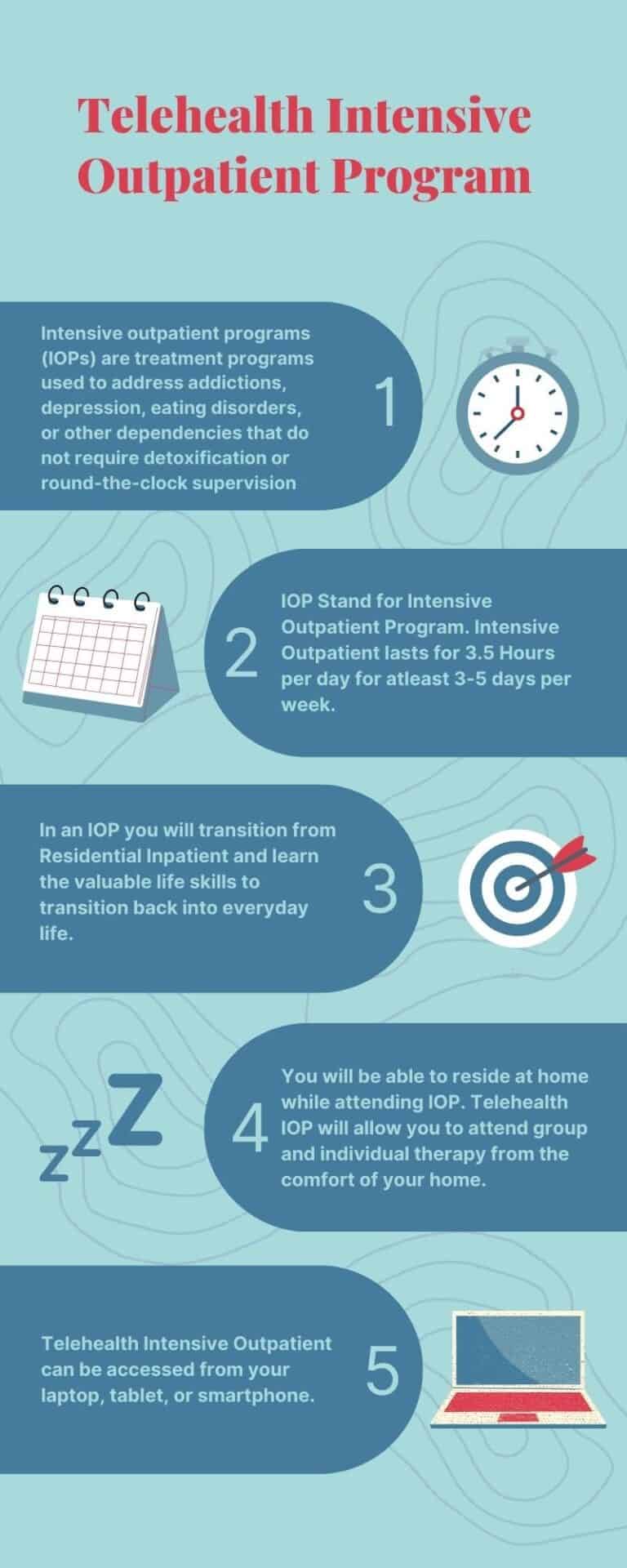The Benefits of Intensive Outpatient Program (IOP) for Long-Term Health.
The Benefits of Intensive Outpatient Program (IOP) for Long-Term Health.
Blog Article
Browsing the Complexities of Twin Medical Diagnosis Therapy Within an Intensive Outpatient Program Setting
In the realm of psychological health and wellness and addiction treatment, the junction of dual diagnosis provides a nuanced difficulty that demands a comprehensive and customized method. Within the confines of an Intensive Outpatient Program (IOP) setup, the intricacies of attending to co-occurring psychological wellness conditions and compound make use of problems need a fragile equilibrium of know-how and resources to navigate. The combination of evidence-based practices, collaborative efforts among multidisciplinary groups, and an eager understanding of the special demands of each person are crucial parts in properly taking care of double medical diagnosis within an IOP framework. By exploring the ins and outs of double medical diagnosis treatment within this extensive outpatient context, a clearer path emerges towards holistic and sustainable recuperation for those grappling with these intertwined obstacles.
Twin Medical Diagnosis Review
What is the relevance of comprehending twin medical diagnosis in psychological health and wellness treatment? Twin diagnosis describes the co-occurrence of a material usage condition and a psychological wellness problem in a person. It is important to recognize and address this comorbidity as it can dramatically influence the performance of mental health and wellness treatment. Without proper identification and monitoring of both problems, individuals might have a hard time to attain enduring healing and security.
Understanding double medical diagnosis is necessary as it calls for a detailed and integrated technique to treatment. By recognizing the interplay between material use and mental health and wellness, health care service providers can tailor treatments to satisfy the one-of-a-kind demands of each individual. This all natural approach not just addresses signs however likewise targets underlying elements that contribute to the double medical diagnosis.
Additionally, untreated twin medical diagnosis can result in a cycle of regression and aggravating mental wellness signs and symptoms. By identifying the complexity of dual medical diagnosis and supplying customized treatment, healthcare experts can support individuals in achieving lasting healing and improved mental wellness.
Tailored Therapy Plans
Identifying the detailed interplay in between material usage conditions and psychological health and wellness problems, the advancement of tailored therapy plans is extremely important in addressing the intricacies of dual diagnosis in mental health and wellness therapy. Tailored therapy strategies are individualized strategies that think about the one-of-a-kind needs, obstacles, and goals of people dealing with twin medical diagnosis. These plans are created collaboratively by a multidisciplinary group of specialists, including psychoanalysts, psychologists, social workers, and dependency professionals, to make sure comprehensive and incorporated care.
Tailored treatment plans usually include a mix of treatments, drugs, and behavioral treatments that target both the compound use problem and the mental health and wellness problem all at once. These plans might consist of cognitive-behavioral treatment, dialectical behavior treatment, medication-assisted treatment, specific therapy, group therapy, and family members treatment, among other evidence-based interventions. By personalizing treatment strategies to individual situations, customized strategies can address the source of dual diagnosis, advertise lasting recovery, and boost overall high quality of life for people fighting with co-occurring problems.
Integrated Treatment Strategy

Furthermore, the social aspect of integrated care involves addressing ecological aspects that might add to the growth or perpetuation important use and mental health problems. This can include family dynamics, real estate instability, or lack of social support. By including social interventions like family members treatment, occupation assistance, and area sources, the therapy becomes much more alternative and tailored to the individual's certain requirements. Generally, an integrated care approach in double diagnosis treatment within an intensive outpatient program setting aims to give extensive, effective, and personalized like people facing co-occurring disorders.
Challenges in IOP Establishing
In the context of dual diagnosis therapy within an intensive outpatient program, navigating the complexities of co-occurring material use disorders and psychological wellness problems presents significant obstacles. One of the main hurdles in the IOP setup is the control of care between mental health and wellness specialists and material abuse professionals to ensure a detailed therapy method. This calls for efficient communication, collaboration, and a deep understanding of exactly how these conditions engage and affect each other.
Moreover, the rising and falling nature important usage conditions and psychological health conditions adds another layer of intricacy - Intensive Outpatient Program (IOP). Customers in an IOP might Find Out More experience sudden changes in their signs and symptoms or substance yearnings, needing punctual treatment and change of therapy strategies. Stabilizing the strength of therapy and support while permitting customers the versatility to handle their daily duties can be a fragile balance to maintain
Additionally, resolving preconception and resistance to therapy within the IOP setup can restrain development. Some individuals might be reluctant to divulge their double diagnosis or might really feel embarrassed, hindering their interaction in the healing procedure. Getting over these obstacles necessitates a supportive and non-judgmental environment that cultivates trust fund and visibility.

Collaborative Expert Initiatives

Collaborative initiatives likewise extend to regular communication and info sharing among staff member to ensure a natural treatment strategy - Intensive Outpatient Program (IOP). This might include case meetings, joint sessions with the patient, or shared paperwork to track progression and change treatment techniques as required. Furthermore, cooperation may include involving various other medical care specialists such as health care doctors or family therapists to provide all natural assistance to the client. Eventually, a united front of professionals functioning with each other improves the performance of dual diagnosis treatment within an extensive outpatient program.
Verdict
To conclude, reliable double diagnosis treatment within an intensive outpatient like it program setting requires customized therapy strategies and an integrated treatment strategy. Difficulties might arise in this setup, but collaborative efforts among specialists can help navigate these intricacies. By resolving the one-of-a-kind demands of people with co-occurring psychological health and wellness and compound use problems, IOP programs can provide important source extensive and alternative like support recuperation and total health.
Report this page